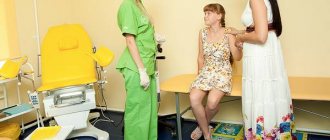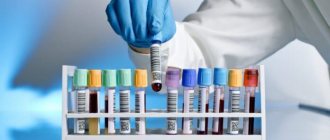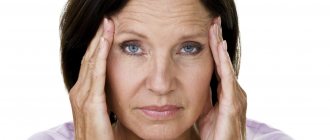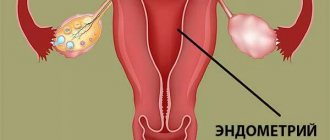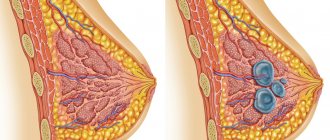Symptoms of menopause in women aged 40-44 years: first signs and treatment
Symptoms of menopause in women aged 40 can manifest themselves to completely different degrees, due to individual hormonal changes. All menopausal changes will not be so terrible and will not lead to serious consequences if the onset of menopause is determined in a timely manner and the necessary treatment is started. This period does not bypass any female representative, helping to prepare the female body for menopause and further transition into old age. In the case when a woman’s body has a high predisposition to certain types of pathologies, then with the onset of menopause, the risk of their development increases several times.
The first signs of menopause in a woman after 40 years, treatment
Menopause is a transitional period in the life of every woman. Among doctors, the more common name is “menopause.” It indicates a loss of fertilization ability. Some people do not experience any distressing symptoms during menopause and this is considered normal. But in at least half of the women who have encountered it, it occurs with disruption of various body systems and pronounced clinical manifestations. Then we are talking about a pathological course or menopausal syndrome. Typically, menopause occurs when you reach 45-55 years of age, but deviations in one direction or another occur.
Menopause is a persistent (more than 1 year) absence of menstruation associated with age-related changes expressed in ovarian dysfunction and hormonal imbalance in the body. At this time, the female body loses its reproductive function. The ovaries stop maturing eggs and the amount of estrogen produced decreases. It is the lack of sex hormones that triggers a chain of changes in the nervous, endocrine and other systems.
The age at which menopause occurs is different for each woman. Basically, it begins at 45-55 years of age, which is the standard and timely menopause. The development of menopause before 40 years of age is called premature. At 41 - 44 years old, the onset of menopause is called early. Its onset after a woman reaches 55 years of age is considered late.
Deviations are mainly due to genetic predisposition. The occurrence of premature or early menopause is influenced by lifestyle and nutrition, the presence of bad habits, and stress factors.
The onset of menopause may not manifest itself in any way. If symptoms are present, it takes a pathological course. This condition is called menopausal syndrome among doctors. The first signs of menopause in a woman after 40 years of age are the same as when it develops at another age, namely:
- hot flashes, felt like a wave of heat rolling over the upper body;
- constant excessive sweating;
- dizziness and headaches;
- weight gain, up to the development of obesity;
- periodic feeling of heart sinking with lack of air;
- brittle nails, loss of shine and hair loss;
- nervous instability, with alternating attacks of excessive irritability and tearfulness;
- apathy, fatigue, loss of appetite;
- anxiety and sleep problems;
- atrophy of the genital mucosa, expressed by itching of the vulva and vagina;
- uterine bleeding, which manifests itself as spotting dark brown discharge.
Among the serious consequences of the onset of menopause, the possibility of developing osteoporosis (destruction of bone tissue), disorders of the cardiovascular system (the occurrence of hypertensive crises, a sharp drop in blood pressure, degenerative changes in the heart muscle) should be highlighted. Existing bronchial asthma is often also complicated by an increase in attacks. Also, against the background of the onset of menopause, cases of the development of type 2 diabetes mellitus (insulin-dependent) have been noted.
Fluctuations in hormone levels can provoke hyperplastic processes in the genitals and other hormone-dependent organs. They can be either benign (fibroids, fibroadenomatosis of the mammary glands) or malignant (cancer of the uterus, ovaries, breast). Therefore, women who experience menopause need to be given increased medical attention.
Causes of early menopause
Menopause occurs at an earlier age if a woman has undergone some negative influences. Among the reasons with a negative focus are:
- Unsatisfactory environmental conditions.
- Use of tobacco products (tobacco smoking).
- Excessive consumption of alcoholic beverages.
- Gynecological abortions.
- Frequent exposure to stressful situations.
- Chemotherapy procedures.
- Hunger strikes and overly strict diets.
But what else can the early symptoms of decline in the reproductive functionality of the female body be associated with? The onset of early menopause may be due to the following factors:
- Hereditary predisposition of the body to the onset of early menopause. If menopause at 42 years of age or earlier is not characterized by manifestations of pathological symptoms and the development of serious diseases, then such menopause is considered normal.
- Previously suffered pathological disorders of the functionality of the genitourinary and endocrine systems of the body;
- Carrying out a hysterectomy or oophorectomy , as a result of which the reproductive organs are excised, and surgical menopause occurs.
In the case when a woman uses hormonal contraceptives for a long period of time, all menopausal changes will occur much later.
The natural onset of menopause is considered to be at the age of 50, but menopause at 44 can also be considered normal.
An important factor is that just before menopause, the symptoms of menopause syndrome begin to appear, which is characterized as the occurrence of certain pathological processes in a woman’s body, as well as a disturbance in her general well-being against the background of changes in hormonal levels.
The most common signs of menopause in women aged 40 appear as follows:
- the appearance of disruptions in the usual course of the menstrual cycle;
- a sharp gain of extra pounds, without any preceding factors;
- the occurrence of attacks of flushing in the upper body;
- an increase in the rhythm of the heartbeat, often occurring in a state of complete rest;
- sleep disturbance and the appearance of insomnia;
- a pathological change in the psycho-emotional state, manifested by increased irritability, tearfulness and nervousness.
Such symptoms of menopause in women after 40 years of age should not become a cause of panic and a reason for making any kind of diagnosis on your own.
If there is a combination of certain deviations in the general condition of a woman from the norm, then this may indicate the initial stage of menopause.
Symptoms of early menopause
Now, after the possible reasons, let's highlight the signs of early menopause at 40 years old.
Signs of menopause usually appear before it occurs. Women in their 30s may experience hot flashes and irregular periods. By the time a woman reaches 40, she will begin the menopausal transition, which is called perimenopause.
It is important that women understand the changes in their bodies, as these changes can lead to osteoporosis, heart disease and other serious conditions. Being well informed is the first step in managing the menopause process.
Early menopause is not just hot flashes. Hot flashes are the most obvious sign, but not the only one, and not everyone has it. Signs of early menopause in women aged 40 are multiple. It is estimated that 15 in 100 women aged 40 to 50 will experience debilitating symptoms caused by decreased levels of ovarian hormones, estrogen and testosterone, forcing them to seek help from a doctor. However, most women will not have a difficult menopause and will enjoy entering a new phase of their lives.
All early signs of menopause in women aged 40 can be divided into conditional categories: general symptoms, changes, feelings, pain and other symptoms. Common symptoms include hot flashes, loss of libido, night sweats, vaginal dryness and irregular periods. The "changes" category includes mental and physical changes in the body, such as fatigue and weight gain. The “feelings” category includes mood swings, depression and feelings of fear. The “pain” section contains headaches, breast tenderness and early signs of osteoporosis. The “other symptoms” category includes symptoms that do not fit into the first four categories, such as hair loss, deterioration of nail structure, etc.
Some early signs of menopause in women over 45 can lead to more serious health problems if treatment is not started promptly. Thus, a symptom that is vaginal dryness can lead to painful sexual intercourse and frequent infectious lesions of the genitourinary system. Signs such as feelings of fear and doom can lead to suicidal thoughts, and without proper support, some particularly desperate women may even harm themselves.
One of the main signs of menopause
The first signs of menopause are changes in the nature of the menstrual cycle. The onset of menopause at the age of 40 is characterized by a weakening of the functioning of a woman’s reproductive organs. It all starts with menstruation disorders, the appearance of delays that increase over time. This ultimately leads to a complete cessation of menstruation and the onset of menopause. All changes in the menstrual cycle and the initial stage of decreased ovarian function occur during premenopause. It is the initial stage of the menopause, lasting from 3 to 7 years, depending on the individual characteristics of each woman.
The second stage of menopause is menopause, characterized by a complete stop of the menstrual functionality of the reproductive organs, caused by an extreme decrease in the production of sex hormones estrogen and progesterone. After a 12-month period of absence of menstruation, the postmenopausal period begins, lasting until the end of the woman’s life.
The first symptoms of menopause, manifested by menstrual irregularities, are characterized by a change in the amount of blood leaving the genital tract. That is, menstruation becomes more scanty or, on the contrary, becomes more abundant. The time intervals between two successive menstrual cycles also change. They can be shorter (less than 3 weeks) or, conversely, longer (more than 36 days).
If a woman experiences menstrual irregularities, she must immediately contact a qualified specialist and undergo an appropriate examination to exclude the development of a serious pathology.
Sexual disorders
Often, the sexual relationships of spouses begin to undergo changes during this difficult period. This is facilitated by the fact that not all men know what menopause in women actually means. Symptoms (age is not the main indicator, because for some it is 40 years old, and for others it is 60) can be aggravated by pain during sexual intercourse, supplemented by tremors in the limbs, dizziness, depression and tension. Of course, this does not at all contribute to harmonious sexual relationships.
However, here everything is individual. If for one woman this period is characterized by a decrease or complete disappearance of libido, then for another, the age after 45 becomes the heyday of her sensuality and sexuality. If the husband is older, then he is no longer able to always match his wife. Quarrels and scandals in this case are difficult to avoid.
All these manifestations can be attributed to menopause in women. Symptoms, which are only getting younger today, will not go away. Therefore, you should often talk to each other about what worries, upsets and worries your partners. This will help you avoid losing the foundation of the relationship. All symptoms of menopause can be successfully treated, so you should immediately consult a doctor.
Hot flashes during menopause
Menopause at 40 years old, just like menopause at 41 years old and later age periods, will not pass without the formation of hot flashes. Hot flashes are a certain reaction of the hypothalamus, which is one of the main departments in the pituitary gland, to a decrease in the level of production of sex hormones by the ovaries. Against the background of hormonal imbalances, the hypothalamus stimulates a sharp increase in luteinizing hormones released into the blood. This causes sudden jumps in body temperature and bouts of sudden fever.
The nature of the manifestation of hot flashes is as follows:
- Unreasonable formation of a strong and sharp feeling of heat, localized in the face, neck and chest.
- Redness of the skin with the appearance of perspiration.
- Increasing the level of general sweating, while maintaining a constant body temperature.
- Decreased physical activity due to severe weakness.
- Attacks of lack of oxygen and the onset of suffocation are possible.
The duration of one hot flash attack can vary between 30 and 60 seconds. The intensity of hot flashes depends on the individual characteristics of each mature lady. Sometimes hot flashes may not cause much discomfort, but the level of increased sweating will persist. This may cause frequent changes of linen, especially at night.
Signs
Hormonal changes may begin at a later date. Signs of menopause in women aged 49 are the same as after 45. The main symptom that causes a lot of trouble is hot flashes. Due to hormonal imbalance, the hypothalamus gives an impulse to dilate blood vessels and release heat. Hot flashes occur periodically and vary in duration. They are characterized by the following symptoms:
- sudden redness of the skin;
- subsequent chills and cold sweats;
- heartache;
- nausea;
- blood pressure jump;
- arrhythmia;
- noise in ears;
- increased sugar levels;
- lack of air.
During menopause, a woman may notice weight gain. After 45 years, symptoms are often observed:
- numbness, tingling of the extremities;
- decreased libido;
- problems with sexual intercourse due to vaginal dryness;
- uterine bleeding;
- change in breast shape;
- exacerbation of existing diseases;
- increased fatigue;
- decreased performance;
- insomnia;
- memory impairment;
- sense of anxiety;
- headache.
Physiological changes
Serious hormonal changes lead to transformation of many functions of the female body. The reproductive period of life ends. During menopause after 45 years, a woman:
- the production of sex hormones stops;
- the egg does not mature;
- the size of the uterus and ovaries are reduced;
- vaginal lubrication is impaired;
- fragility of blood vessels appears, which leads to bleeding;
- as a result of a decrease in the acidity of vaginal mucus, there is a risk of developing sexually transmitted infections.
During menopause, changes occur in the urinary system. A decrease in the tone of the bladder walls can lead to urinary incontinence. Women over 45 years of age may experience the following symptoms:
- vasoconstriction disrupts the nutrition of tissues - sagging skin, sagging of the contours of the face and body;
- increased bone porosity, which leads to frequent fractures;
- loss of subcutaneous fat provokes an increase in the number of wrinkles.
- How to shave your bikini area without causing irritation
- How to disable the melody instead of the beep on MTS
- Viral pneumonia: signs and treatment in children and adults
During menopause after 45 years, you can observe the appearance of symptoms of physiological changes in the female body:
- age spots;
- brittle nails;
- hair loss;
- early graying;
- acne, blackheads;
- swelling of the face, limbs;
- gaining excess body weight;
- redness of the skin;
- pallor.
Changes in a woman's character after 45 years
Fluctuations in hormonal levels during menopause cause sudden changes in mood. The character traits of a woman that were present before the age of 45 suddenly begin to manifest themselves with particular force. The slightest problems can throw you off balance for a long time. The following symptoms appear:
- emotional instability;
- suspiciousness;
- hot temper;
- tearfulness;
- irritability;
- jealousy;
- aggressiveness;
- anxiety;
- vulnerability.
Women over the age of 45 often feel useless. Changes in appearance and the feeling of approaching old age cause depression. Symptoms may appear that indicate a change in character. These include:
- demonstrative actions;
- unwillingness and inability to change;
- increased sensitivity;
- passivity;
- nervousness;
- grumpiness;
- constant dissatisfaction.
Sexual disorders
Menopause after 45 years leads to changes in the genital organs. The vagina shrinks, its elasticity decreases, and its walls become thinner. Natural secretion is reduced, and dry mucous membranes appear. All this causes problems in sexual life. Women sometimes experience symptoms of menopause at age 45:
- lack of libido;
- increased sexual desire;
- burning, pain during sexual intercourse;
- aversion to sex.
Treatment of menopausal syndrome
Treatment of menopause itself is not required if it occurs naturally and the symptoms are not severe. But in cases where menopausal symptoms become very acute, special therapy is required.
If menopause occurs at the age of 43, and the woman still plans to give birth to a child, then all measures must be taken to stop the development of menopausal symptoms.
Medications based on synthetic hormones will help:
- Normalize the psycho-emotional state.
- Adjust and normalize blood pressure.
- Reduce the intensity of hot flashes and get rid of tachycardia and arrhythmia.
To alleviate the condition, it is recommended to completely review and change your usual lifestyle, namely:
- balance your diet;
- stop smoking and drinking alcohol;
- maintain moderate physical activity.
It is recommended to diversify the daily diet, especially the summer food menu, with the following food products:
- Fish.
- Fresh vegetable and fruit crops.
- Walnuts.
- Low-fat milk derivatives (kefir, yogurt, fermented baked milk, sour cream).
Among other things, it is necessary to completely exclude all fatty, fried and spicy foods from the diet. It is better to keep sweets and baked goods to a minimum.
Menopausal symptoms can be treated not only with the right lifestyle. Significant relief can be achieved by taking special medications, as well as using various traditional methods of treatment.
Hormone therapy
The most effective treatment is hormone replacement therapy for menopause, which promotes noticeable relief of menopausal symptoms and prevents the development of serious pathological processes.
Among the most effective hormone-containing drugs are:
- Ovestin , Divigel and Estrofem are hormone-containing drugs that include synthetic estrogens;
- Klimonorm , Divina , Femoston , Angelique , etc. are hormonal drugs with a combined spectrum of action, containing both estrogens and progesterones.
These medications should only be prescribed by a medical specialist.
Phytotherapy
But what to do if there are contraindications to the use of hormonal drugs? In this case, experts are considering such an excellent alternative as homeopathic preparations developed on the basis of medicinal herbs containing phytoestrogens. Klimistil was recognized as one of the best such drugs, which not only reduces unpleasant symptoms, but also enriches the body with all the necessary substances and elements.
Treatment with homeopathic medicines is usually supported by taking vitamin complexes, dietary supplements and folk methods, characterized by the preparation of various decoctions, infusions and tinctures.
Many women ask the question: “can any remedy completely eliminate the onset of menopause?”
Menopause or menopause are natural processes of age-related changes in the body that cannot be avoided under any circumstances.
But it is quite possible to prevent their earlier onset and push back menopause by several years. To do this, you just need to properly monitor your health, including reproductive health, lead a healthy lifestyle and timely undergo scheduled examinations in the gynecological office.
Timely detection of the onset of menopause will help avoid the development of unpleasant symptoms in the future.
Educational video on this topic:
The onset of menopause at 44 years old. Symptoms and causes of onset. Why is early menopause dangerous?
If menopause occurs in a woman’s body at the age of 44, then this indicates disturbances in the body. Only in a small number of women is the early onset of menopause normal and is a consequence of the influence of hereditary factors.
When early manifestations of menopause occur in the body, this is a sign of menopause. Complete absence of the menstrual cycle for a period of up to a year or more. This can be caused by several factors:
- Depletion of follicles in the ovaries.
- Hormonal imbalance in the body, which is associated with improper production of sex hormones.
Several years before the onset of menopause, a woman’s body undergoes perimenopause, which lasts from 2 to 6 years, but can occur according to individual time frames.
Any changes in the menstrual cycle that imply its cessation, irregular discharge, frequent breaks between menstruation are a clear sign of the onset of menopausal changes in a woman’s body.
The patient needs to seek help from specialists and undergo the necessary tests, with the help of which the doctor can determine whether the onset of menopause is the cause of premature decline of ovarian function. In this case, treatment with drugs to prolong youth and the reproductive period is ineffective.
To determine the onset of menopause, a woman needs to donate blood for hormones: FSH and estradiol. The level of follicle-stimulating hormone helps to detect the onset of menopause and determine treatment to eliminate its symptoms.
Early menopausal changes in the body of a young woman may differ from the onset of menopause in its usual terms. An incompletely exhausted supply of eggs can trigger pregnancy, childbirth is easier, and such children turn out healthier, and they are usually called “lastborn.” With normal menopause, ovulation is impossible.
A blood test for hormones will help diagnose the onset of menopause
Symptoms of early menopause and the dangers of menopause at this age
The early appearance of menopausal symptoms between the ages of 35 and 44 years is associated with early acceleration. Puberty occurs earlier in adolescents, and the age range of aging moves forward several years.
Early menopause at the age of 44 is more severe than menopause at its usual age and has a longer period. Women who have entered menopause at the age of 44 years note a significant change in the skin of the face and body, the appearance of wrinkles and early skin pigmentation. The breasts lose their shape, excess fat appears on the abdomen and hips, and the risk of developing cardiovascular diseases increases. Elevated cholesterol levels in the blood lead to thrombophlebitis, which increases the risk of heart attack or stroke at an early age. During early menopause, women become insensitive to the pancreatic hormone insulin. This can cause the development of type 2 diabetes. Early menopause is a pathological period for the development of tumors of the breast and reproductive system. Loss of bone tissue leads to early osteoporosis.
Changes in facial skin and internal organs
Estrogen is responsible for skin regeneration, for its ability to recover and renew itself. It is age-related changes in the face in women after 40 that are associated with their absence. During this period, new cells are formed slowly, and keratinized scales grow, which makes the upper layer of the epidermis thicker and rougher. At 40–45 years of age, metabolic processes slow down and the secretion of the sebaceous glands, which are responsible for the external protection of the skin from environmental influences, is reduced. Blood flow deteriorates, delivering an insufficient amount of oxygen and beneficial microelements to the cells. Daily care, the use of anti-aging and nourishing cosmetics, peeling, massage, etc. will help eliminate the consequences of visible age-related changes in women aged 40 on the skin of the face, tighten muscles and restore microcirculation.
Due to changes in a woman’s body after 45 years, there is a decrease in:
- bone mass, leading to its fragility;
- body flexibility;
- mobility of the spine and joints;
- muscle tone and muscle elasticity.
Hormonal disruptions lead to disruption of the menstrual cycle, which is the first step to the onset of menopause, then menopause and the complete cessation of menstruation. In this regard, what happens:
- deterioration of health,
- profuse sweating;
- tides;
- increased blood pressure, etc.
Symptoms of menopause appear at the age of 45-55 and are purely individual characteristics, depending on hereditary or genetic factors, ecology, lifestyle and the presence of chronic female diseases. At this age, there is a huge risk of developing cancer, so visiting a gynecologist or gynecologist-endocrinologist who determines hormonal parameters is very important. In case of severe menopause or early onset, a specialist will prescribe replacement therapy that corrects hormone levels, which will significantly facilitate the process. Many women associate taking hormonal medications with gaining extra pounds and are in no hurry to use them. It is necessary to dispel their doubts as corrective therapy is based on natural ingredients, progesterone and estrogen supplementation. The drugs are made in various combinations and their composition differs depending on hormone levels, the woman’s age, and the stage of menopause during which they will be taken. Synthetic drugs are not used to eliminate early symptoms and severe menopause. Experts recommend taking these medications and note a significant improvement in the general condition of a woman’s body after forty-five years and at an earlier age during the period of hormonal changes.
The first manifestations of menopause in women at 43
As women reach 43 years of age, changes may begin to occur in the body that have a more profound effect on the functioning of the body than at the beginning of the process of attenuation of ovarian function. Changes affect not only the genitourinary system; the nervous, regulatory, and metabolic systems are also transformed. Symptoms of menopause at this age cannot go unnoticed by women for long, although they do not always manifest themselves as changes in the quality of life.
At the age of 40-43 years, sometimes the first signs of early menopause begin to appear, such as irritability, increased sweating, sudden weight gain, weakness or drowsiness.
General information about menopause
Menopause occurs not only in the female, but also in the male body. In women, it occurs after 40-44 years of age more acutely and quickly (within three to five years), in men it occurs more mildly, but lasts for a long time. Symptoms of menopause are caused by unstable, but stable over a period of time, dysfunction of systems in the body. The presented process begins as a response to a sudden suppression of the gonads, which has obvious signs.
In women, the onset of menopause is directly related to specific modifications in the system of such parts of the body as:
- hypothalamus;
- pituitary lobe;
- ovaries.
This is expressed in the gradual extinction of the menstrual functions of the body. The intervals between each menstruation turn out to be longer and longer, which gradually leads to the fact that they stop altogether.
This is explained by the fact that at 40-44 years old, changes and symptoms begin to appear in the cells of the hypothalamus that are directly related to age. The release of neurohormones, which previously was carried out in accordance with a certain cycle, ends.
This is the function of the body that was provided by the pituitary gland, which is an endocrine gland and produces hormones. They affect the reproductive system of the female body.
When the above process starts:
- eggs stop forming in the ovaries;
- the uterine mucosa becomes thinner (and characteristic pain symptoms are observed);
- the nerve impulses that go from it to the ovaries, as well as the hypothalamus, become weaker.
Such active changes and restructuring in the body are often accompanied not only by vascular, but also by nervous disorders:
- tides;
- headache (especially after 40 years);
- irritability;
- insomnia;
- decreased performance (most often manifests itself after 44);
- sudden increase in blood pressure.
All this is due to changes that begin to appear with age in the hypothalamus, in those central areas that control all functions of the heart in women, blood vessels, lungs and other internal organs. These processes have very serious symptoms and are unambiguous “bells” about the onset of menopause.
These dysfunctions occur over a period of one to two years, and then gradually disappear. This restructuring ends with a phenomenon called menopause. It symbolizes the absolute completion of menstruation, balance is restored in the body, and any of the women who have experienced this again feels great, forgetting about the symptoms of menopause.
Age changes at 43 years old
The onset of menopause does not occur instantly. Changes occur in a woman’s body over a very long time - from a year to 10 years. If at the age of 40 the signs of decline in ovarian function are faintly noticeable, then over the next years they become more pronounced. This period in a woman's life is called perimenopause, it begins just around the age of 43 years.
The essence of menopausal changes is manifested in changes in the functions of the ovaries, which work less and less, but the main functions in them are still preserved. In the same way, the maturation of eggs in the follicles occurs, during which an active process of estrogen synthesis occurs, the release of the egg into the fallopian tubes, its death (in the absence of fertilization) and the formation of the corpus luteum, which synthesizes progesterone. The finale of the monthly cycle is menstruation, during which the corpus luteum is reduced, and the uterine mucosa begins to exfoliate and is excreted with a limited amount of blood.
With the onset of menopause, one or more indicators in most cases are disrupted: menstruation becomes extremely irregular (delays or early onset of bleeding are observed), more abundant or very scanty. In the case of such manifestations, gynecologists say that there are signs of the onset of menopause.
Women can observe this condition, characteristic of perimenopause, earlier, but most notice a disruption in the menstrual cycle precisely at the age of forty-three, which is the norm.
Main signs of premenopause
Early disorders indicate only signs of decline in reproductive function. The onset of menopause is characterized by a gradual increase in symptoms, which become brighter every year. First of all, a woman notices a disruption in her menstrual cycle. Menstruation does not come on time, may be significantly delayed, or, conversely, bleeding suddenly begins in the middle of the cycle. In addition, in the spring, a number of menopausal disorders associated with fatigue and vitamin deficiency are observed.
The main complaint is hot flashes, that is, sudden redness of the face, neck and back of the head, which are accompanied by a feeling of heat. The woman should remain calm: these attacks do not last long, usually 2-3 minutes. Excessive sweating greatly spoils life, especially during upcoming important meetings.
Stages of menopause
There are three main phases - perimenopause, menopause and postmenopause.
When menopause occurs, menstruation stops completely, and the health risks are more profound, for example, the onset of osteoporosis. The age of menopause is 50-55 years.
Postmenopause in women occurs at the age of 55-60, is characterized by complete hormonal changes in the body and brings it closer to the onset of old age over the age of 70, which is also a natural biological process.
Symptoms, causes and diagnosis of menopause at 43 years old
Perimenopause, or the period preceding the onset of true menopause, is often accompanied by slight changes in women's well-being, with the exception of pathological menopause.
The main signs of the onset of perimenopause in women aged 40-43 years are changes in the structure of the pelvic organs, as well as the external genitalia:
- due to inhibition of ovarian function, the uterus decreases in volume;
- the process of withering of the external genitalia begins;
- the mucous membrane becomes thin and dry;
- the pelvic muscles atrophy, which leads to prolapse of the uterus and bladder and often to urinary incontinence.
All of the above changes in a woman’s body do not occur instantly - a noticeable estrogen deficiency appears within 3 years, and until this time the woman may not notice the changes occurring.
Even in the complete absence of external tangible symptoms of menopause, metabolic changes begin to occur:
- calcium is absorbed less well in the gastrointestinal tract and is excreted from the body more actively, which makes bones more fragile;
- in women, the activity of the immune system changes, chronic diseases begin to worsen;
- 50% of women in the first 3 years of menopause have problems with the vegetative-vascular system and in the psycho-neurological sphere.
All these signs of perimenopause very often cause a deterioration in well-being.
To do this, the patient undergoes a comprehensive examination, as a result of which the following is established:
- the amount of hormones synthesized by her body;
- general and biochemical composition of the patient’s blood and urine;
- existing changes in the functions of internal organs and glands;
- concomitant systemic pathologies.
Signs of menopause in women aged 40-43 years:
- general deterioration of health - increased fatigue, decreased endurance;
- hot flashes - a feeling of intense heat in the chest, on the face;
- excessive sweating;
- insomnia and changes in overall sleep patterns;
- changes in mood that occur regardless of external factors;
- anxiety - a feeling of strong anxiety appears for no apparent reason;
- Frequent urination or involuntary leakage of urine.
Visual changes
Hormonal changes in women after 40 are the causes of extra pounds that need to be combated, not only in order to look good, but also due to brittle bones and stiff joints. Heavy weight often causes the development of osteochondrosis, osteoporosis, joint deformities and other problems of the musculoskeletal system. In this case, it is necessary to lose weight after 40 and real advice, selected from specialized Internet resources, will help you cope with the problem and select based on individual indicators , suitable recipes.
Hormonal changes in women after 40 lead to a loss of vigilance related to her weight. There is no need to believe the scales, which have shown a constant figure for many years, but we need to remember the fact that the weight of bone and muscle mass has decreased and, in connection with this, the appearance of fat on the abdomen, waist and hips should force the woman to take appropriate measures of “physical influence”. Because her weight has remained at the same level, the lady prefers not to notice the excess fat folds.
Treatment of menopause
If there is a violation of the regularity of menstruation, then gynecologists rarely talk about the pathology of menopause. Most often, at this age, a natural physiological decline of reproductive functions occurs, but in rare cases it can be difficult to do without medical help.
Even if a woman does not experience problems with her mental and physical condition, when menopause occurs, she is recommended to visit a gynecologist once every 6 months.
Comprehensive treatment of symptoms that appear during menopause is required if:
- menstruation stopped abruptly or became more intense and prolonged;
- bleeding occurs several times a month;
- hot flashes occur daily and interfere with the usual way of life;
- signs of arterial hypertension appear;
- symptoms of arrhythmia or tachycardia appear;
- rapid weight gain noticed;
- depression and insomnia become more prolonged;
- there is a feeling of pain in the lower abdomen;
- painful lumps appear in the chest.
The gynecologist draws up an individual treatment plan that helps not only eliminate discomfort, but also reduce the risk of severe manifestations of diseases of the genitourinary, endocrine and cardiovascular systems.
Medicines for menopause
They are prescribed only if there is a complete examination and opinions of related specialists.
- drugs that relieve symptoms of functional disorders: heart rhythm disturbances, changes in the functioning of the nervous and digestive, vegetative, vascular, and endocrine systems;
- hormonal drugs - synthetic, natural hormones, phytohormones;
- vitamin and mineral complexes, dietary supplements that can normalize metabolic processes.
Good results are obtained with drugs containing phytohormones, such as “Estrovel”, “Qi-klim”, but before use you need to consult a doctor who will select the dosage and duration of taking the medicine.
Other methods
Folk remedies also come to the aid of the female body - a decoction of chamomile, mint, oregano taken at night will help calm hot flashes and improve sleep. A decoction of nettle will help with bleeding that lasts longer than usual; valerian root, steamed in boiling water, will help with anxiety and tachycardia.
A course of medication for menopause is a prerequisite for effective treatment. Hormonal medications should be taken for at least 3 months with a break for the same period. Sedatives should be taken continuously, and hormones should be taken in courses of 2-3 months.
Surgical treatment of menopausal manifestations is rare and only with serious changes in the functioning of the genitourinary system, heart and blood vessels.
Possible complications
Atypical manifestations of the onset of menopause in women are psychosomatic disorders (prolonged depression, sleep disorders, neuroses), exacerbation of chronic diseases occur in 65-70% of women in the onset of menopause.
Osteoporosis appears in 60% of gynecologists' patients.
Vegetative vascular dystonia, tachycardia, and high blood pressure occur in 70% of women during menopause.
You need to be attentive to your body and if the first signs of menopause appear, you should consult a doctor, even if they do not cause severe inconvenience. The doctor will prescribe medications that can slow down the processes of incipient ovarian dysfunction.
Lifestyle and nutrition recommendations, prevention
Naturally based sedatives are recommended for use in cases of nervous disorders.
Relaxing physiotherapy works great in this regard: baths, massage, breathing exercises.
Eating foods rich in vitamins and microelements: fish, poultry, herbs, legumes, vegetables and fruits helps maintain hormonal levels.
- Metabolic processes can be normalized by changing the diet - food should not be so high in calories and contain much more vitamins and minerals, and especially calcium.
- Try to eliminate stress and increase the number of walks in the air, which, with the restoration of the emotional background, will help restore sleep.
- Increase physical activity with an emphasis on strengthening the muscles in the pelvis - this will avoid their weakening.



